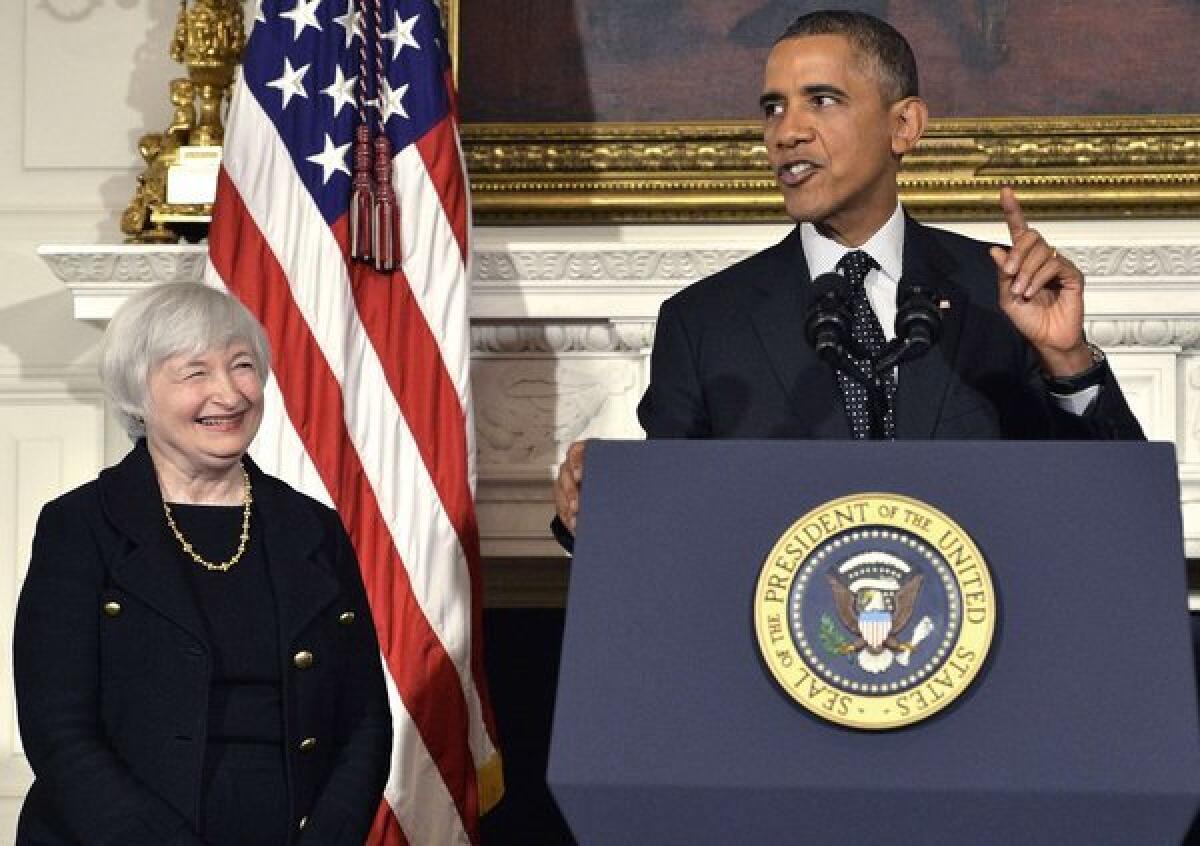Nearly 5 years in office, Obama only now gets to fill some key posts

WASHINGTON – Janet Yellen’s appointment as head of the Federal Reserve has attracted a lot of attention for her gender – she’ll be the first woman to head the world’s most influential central bank in its 100-year history. But as a lesson in presidential power and the importance of second terms, consider another fact: Yellen will be the first Democrat to hold the job in a generation.
Since 1987, when Paul Volcker stepped down from the chairman’s job, Democrats have won four of seven presidential elections. But the Fed chairman’s job overlaps presidential terms, and as luck would have it, both President Obama and President Clinton inherited Republican appointees whose terms expired during difficult economic times early in their tenures.
In both cases, the Democratic presidents chose to keep the GOP appointees on for an additional term. It’s only now, in his fifth year in office and with Ben S. Bernanke signaling a desire to retire, that Obama is free to appoint a Democrat to the office.
That holdover phenomenon happens more often than one might think.
FULL COVERAGE: The U.S. government shutdown
To take just two high-profile examples, it was just this year that Obama got to choose a director of the FBI, James B. Comey, replacing Robert S. Mueller, who had been appointed by President George W. Bush a dozen years earlier. (The FBI director serves a 10-year term, but Obama had asked Mueller to stay an extra two.) And Michael J. Astrue, a Republican who started work in Washington in the Reagan administration, finished his six-year term as Social Security commissioner, the head the government’s single biggest program, in January.
In some cases, the transition from one party to another makes little difference. The FBI has carefully stayed out of partisan politics since the Watergate era. And Bernanke as Fed chairman has turned out to be a relative “dove”– one who regards unemployment as an important problem that the Fed needs to combat, even at the risk of some inflation. So his opinions about monetary policy and Yellen’s probably will agree more than they would if she had replaced a more “hawkish” Republican appointee.
In other cases, the partisan shift can matter greatly, as holdovers in key posts can stymie an administration’s policies. White House economic policymakers have spent years fighting with Edward DeMarco, the head of the Federal Housing Finance Agency, who has opposed administration plans to provide additional aid to homeowners at risk of foreclosure. Under law, DeMarco, the agency’s acting director, gets to stay in charge until a successor wins Senate confirmation, something that GOP senators, who approve of DeMarco’s policies, have blocked.
PHOTOS: 2013’s memorable political moments
Winning two terms in office gives a president much greater odds of filling jobs that come with fixed terms. When a party can control the presidency for three terms in a row, those odds come close to being unbeatable. That’s one reason why the Republican Party will risk so much if it cannot become competitive in the next presidential election: The nonelected, but powerful, positions that Republicans still hold in the federal government are fast dwindling.
The biggest remaining prize, of course, is the Supreme Court, and there, the partisan divide matters greatly. The court’s four Democrats and its five Republicans frequently disagree on major legal issues. The court’s three oldest members, the liberal Justice Ruth Bader Ginsburg, who is 80, and the conservatives Antonin Scalia and Anthony Kennedy, both 77, are all likely to step down either in Obama’s term or that of his successor.
Follow Politics Now on Twitter and Facebook
Twitter: @DavidLauter
More to Read
Start your day right
Sign up for Essential California for news, features and recommendations from the L.A. Times and beyond in your inbox six days a week.
You may occasionally receive promotional content from the Los Angeles Times.







